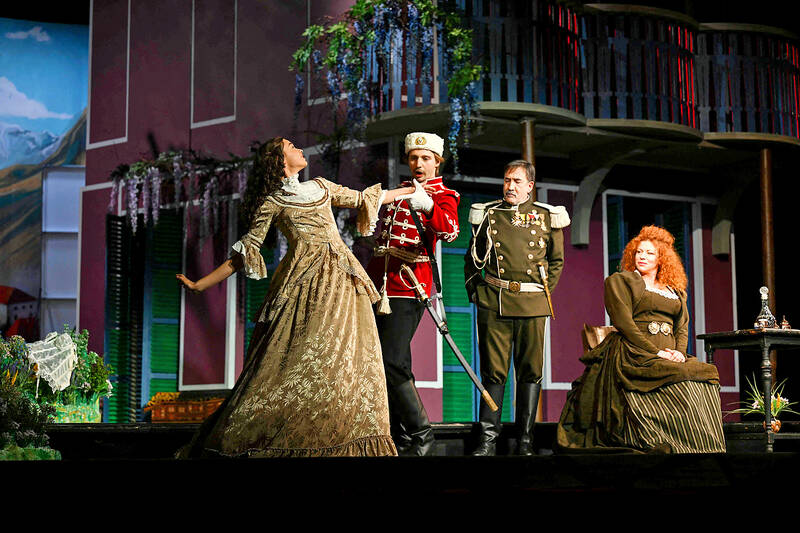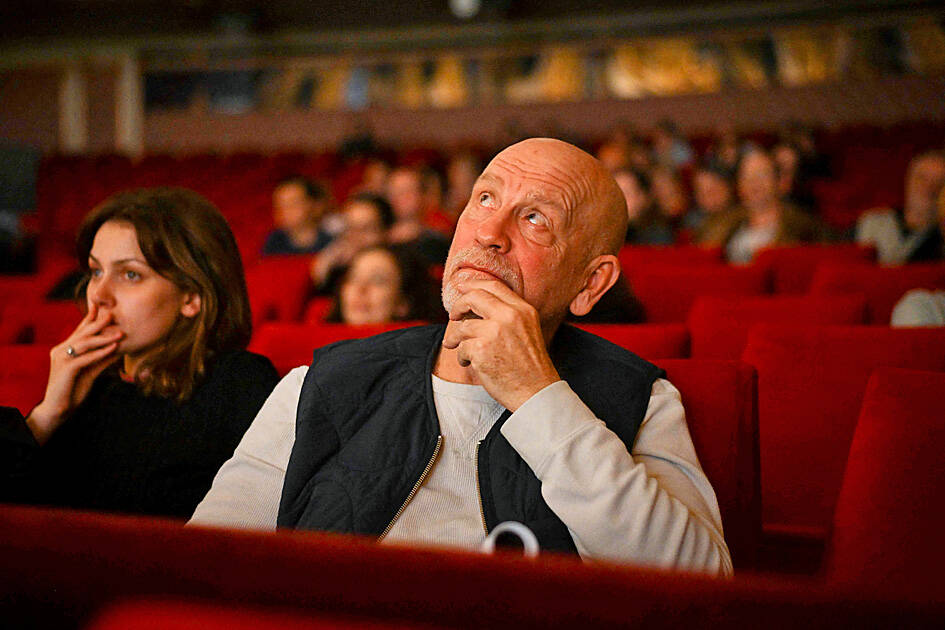A 19th-century play directed by US actor John Malkovich has enraged nationalists in Bulgaria who call it an insult to the country — a claim the Hollywood star rejected as stirred up by the far right.
Last week’s premiere of Arms and the Man by Irish-born playwright George Bernard Shaw sparked raucous protests by nationalist groups.
Holding up banners that read “Malkovich go home,” protesters on Thursday blocked access to the Ivan Vazov National Theatre in the capital, Sofia, before attempting to storm it, accusing the 70-year-old director of ridiculing the country’s history and its citizens.

Photo: AFP
“This play is a disgrace and must be banned. It makes a mockery of our ancestors who perished for Bulgaria,” shouted 21-year-old student Yoana Ilieva, part of an infuriated crowd.
After the play premiered in an almost empty theater, Malkovich expressed his astonishment over how his production was received.
“It’s a quite odd reaction, but it is a strange time in the world — more and more people love to censor things they don’t agree with,” he said at a press conference alongside several actors on stage.

Photo: AFP
Brandishing Bulgarian flags, a mob of angry protesters verbally and physically assaulted the director of the theater and the former culture minister among others.
The prosecutor’s office has opened an investigation into the clashes.
The play is a humorous take on the Serbo-Bulgarian conflict in the late 19th century, exploring the absurdity of war while exposing the flaws of heroic adulation and militarism.
It is a “charming, light, kind of anti-war” comedy that Malkovich had already staged on Broadway in 1985, he said in an interview.
He said he considered that seeking historical accuracy in a play was “frighteningly naive.”
Malkovich said he was “pretty sure I’ve never insulted any of the 47 countries” he has worked in, adding that such an accusation “could only be posited by people who don’t know me at all.”
“I think it’s not about the play at all. And I’m not even sure it’s about me, really,” he said.
According to Malkovich, Shaw “knew nothing about Bulgaria,” saying the playwright “just wanted a place to set the war.”
He said he believed far-right protesters were trying to grab people’s “attention for the things they want.”
Bulgaria, the EU’s poorest nation, has been plagued by political turmoil since 2021, which has favored the country’s far right amid a surge in pro-Russian disinformation campaigns, non-governmental organizations in the country said.
For the pro-Russian, ultranationalist Vazrazhdane party, the third-largest force in parliament, “not only is the play mediocre,” but the production also had “totally inadequate staging.”
Bulgaria’s conservative writers’ union SBP said “such works” had no place in Bulgaria, criticizing what it perceived as the “mockery of the thousands of soldiers who fell at the front for the freedom and reunification of the country.”
The play had already been staged twice by Bulgarian director Nikolay Polyakov in 1995 and 2000, without sparking large public outrage.
“The current climate is much more tense, with passions running high and hatred fanned against everything Western and American,” Polyakov said.

IDENTITY: A sex extortion scandal involving Thai monks has deeply shaken public trust in the clergy, with 11 monks implicated in financial misconduct Reverence for the saffron-robed Buddhist monkhood is deeply woven into Thai society, but a sex extortion scandal has besmirched the clergy and left the devout questioning their faith. Thai police this week arrested a woman accused of bedding at least 11 monks in breach of their vows of celibacy, before blackmailing them with thousands of secretly taken photos of their trysts. The monks are said to have paid nearly US$12 million, funneled out of their monasteries, funded by donations from laypeople hoping to increase their merit and prospects for reincarnation. The scandal provoked outrage over hypocrisy in the monkhood, concern that their status

Trinidad and Tobago declared a new state of emergency on Friday after authorities accused a criminal network operating in prisons across the country of plotting to kill key government officials and attack public institutions. It is the second state of emergency to be declared in the twin-island republic in a matter of months. In December last year, authorities took similar action, citing concerns about gang violence. That state of emergency lasted until mid-April. Police said that smuggled cellphones enabled those involved in the plot to exchange encrypted messages. Months of intelligence gathering led investigators to believe the targets included senior police officers,

A disillusioned Japanese electorate feeling the economic pinch goes to the polls today, as a right-wing party promoting a “Japanese first” agenda gains popularity, with fears over foreigners becoming a major election issue. Birthed on YouTube during the COVID-19 pandemic, spreading conspiracy theories about vaccinations and a cabal of global elites, the Sanseito Party has widened its appeal ahead of today’s upper house vote — railing against immigration and dragging rhetoric that was once confined to Japan’s political fringes into the mainstream. Polls show the party might only secure 10 to 15 of the 125 seats up for grabs, but it is

FOREST SITE: A rescue helicopter spotted the burning fuselage of the plane in a forested area, with rescue personnel saying they saw no evidence of survivors A passenger plane carrying nearly 50 people crashed yesterday in a remote spot in Russia’s far eastern region of Amur, with no immediate signs of survivors, authorities said. The aircraft, a twin-propeller Antonov-24 operated by Angara Airlines, was headed to the town of Tynda from the city of Blagoveshchensk when it disappeared from radar at about 1pm. A rescue helicopter later spotted the burning fuselage of the plane on a forested mountain slope about 16km from Tynda. Videos published by Russian investigators showed what appeared to be columns of smoke billowing from the wreckage of the plane in a dense, forested area. Rescuers in